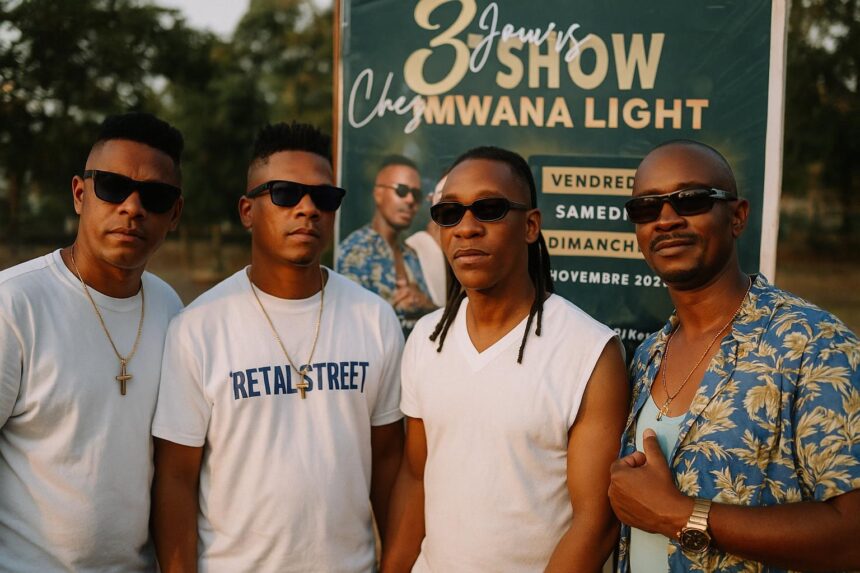Pointe-Noire ready for an urban soundwave
From 31 October to 2 November, Pointe-Noire’s Mwana Light complex will keep its sound system roaring past dawn. The collective Clan One Force picked the Atlantic seafront to host “Three Days of Show”, a marathon built to celebrate Congolese youth, nightlife and artistic freedom.
City officials quietly welcome the initiative, seeing it as a chance to boost evening commerce and showcase local know-how. Street food vendors, moto-taxi unions and nearby guest-houses are already stocking up, expecting what one bar owner calls “the busiest holiday week since last Christmas”.
Tickets, priced to fit student budgets, went on sale last weekend and half of the early-bird stock reportedly vanished in 48 hours (organisers). The social-media buzz has since pushed the hashtag #MwanaLight72h to the top of Congolese Twitter trends.
Five DJs, five sonic fingerprints
DJ Katmay opens the decks. A legend of Brazzaville’s underground, he cuts rumba samples into house structures with surgical timing. “I want dancers to feel unity in the kick drum,” he tells us between rehearsals, promising an intro set that climbs from 95 to 125 BPM without warning.
Next up, DJ Flamme Rouge blends the warmth of vintage soukous guitars with airy synth pads and deep basslines. His sets often resemble a film soundtrack, each transition guiding the crowd through changing emotional landscapes while never drifting from the central Congolese groove.
DJ Mick, an afro-beat ambassador, builds expansive sound mosaics. He often layers Fela Kuti horn stabs over present-day amapiano shakers, creating what critics dub “heritage future funk”. His selection focuses on feel-good riffs that keep even first-time clubbers moving together.
For those craving edge, DJ Corbillard delivers. Known for sudden drops and industrial textures, he turns each track into a manifesto. He insists the goal is not shock but liberation: “If a beat surprises you, it frees you,” he states, tightening cables before a test run.
Finally, DJ Moussampay embodies the crew’s next generation. Barely out of university, he already commands minute-long crescendos that explode into chanted hooks. His rapid rise on the coastal circuit has convinced elders that Pointe-Noire’s DJ scene will stay innovative for years.
A celebration built around community
Beyond the lights and subwoofers, the festival’s mission is to weave stronger social ties. Organisers plan a daytime workshop where teenagers can learn basic beat-matching and digital production. A local youth centre will lend laptops, and each DJ has agreed to mentor at least ten attendees.
Neighbourhood associations from Tié-Tié to Loandjili are coordinating street clean-ups before and after the event. “We dance at night, we tidy in daylight,” laughs volunteer coordinator Mireille Okoko, who believes the effort proves parties and civic duty can share the same stage.
Small craft brands have also joined. Wax-print clothing stalls, handmade jewellery stands and pop-up photo studios will ring the venue, turning the festival grounds into a temporary creative market and giving young entrepreneurs a rare showcase outside social media timelines.
What dancers should know before arriving
Gates open every afternoon at fifteen-hundred hours, with music scheduled until sunrise. Security teams will check IDs and ban single-use glass to reduce waste. Free drinking water stations line the perimeter, answering recent public calls for safer nightlife after several dehydration incidents downtown.
Organisers recommend debit cards or mobile money, as the nearest ATM often runs empty on event nights. A shuttle route linking Mvoumvou, Centre-Ville and Mvoungouti operates every hour for 500 FCFA, with police presence pledged at major stops to reassure late-night travellers.
The weather bureau predicts calm seas and dry skies, yet coastal breezes can drop temperatures near dawn. Seasoned clubbers suggest packing a light jacket so energy can stay focused on dancing rather than shivering when the sun finally peeks over the port cranes.
Beats that echo beyond the weekend
Clan One Force says a portion of ticket revenue will fund studio time for emerging singers who cannot yet afford professional sessions. The aim is to convert festival momentum into lasting discography, strengthening Congo’s presence on streaming platforms and radio playlists across the continent.
If the three-night experiment succeeds, Pointe-Noire may earn a yearly slot on the regional clubbing map, attracting visitors from Luanda, Libreville and Kinshasa. For now, the city simply counts the days until the first bassline drops and the crowd’s collective heartbeat takes over.





















